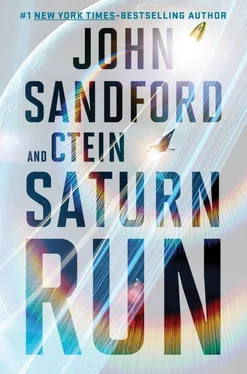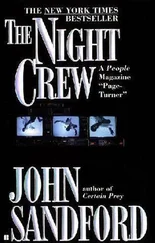In recognition of the President who first brought the Americans and Chinese into ongoing cooperation in the modern era, breaking down the barriers that had separated our people for many decades, almost a century ago, we will rename the USSS3 as the Richard M. Nixon.
A century ago, it was only Americans who set foot on the moon. They gave lip service to “for all mankind” but nothing more. We’ve moved beyond that. We’re not out to steal China’s glory nor beat them to Mars. We fully intend to give them the honor of placing the first footsteps on Martian soil. They have earned it. Then we can proceed together, as humanity expands into the solar system.
I expect, not too many months from now, to be congratulating our Chinese and American pioneers as they stand side by side under the rust-colored skies of Mars. Godspeed to them all.
Chen shook his head, said, “What is this? What can it be?”
The elevator door opened in the communications unit, where two armed guards were waiting with submachine guns, which they promptly pointed elsewhere.
Jiang paused, and said quietly, “I can tell you what it is. It’s bullshit, Chen. The Americans are fucking with us. I don’t know why, but I want you to find out.”
“They must know that we’re sending a colony ship,” Chen said. “They’re afraid that we’re going to use that to lay claim to Mars. They’re making sure to let us know that that is not an acceptable outcome, and they’re taking steps to prevent it.”
Jiang asked, “Are we doing that?”
“Boss, that would be a complete violation of the International Space Treaty that has served both sides very well for the past thirty years. No, we are not doing that. Even if we did, everybody would just laugh us off. It’d be like… claiming the moon.”
“You’re sure?”
“I’m sure, boss. There are probably a few idiots in Beijing who’ve tried to bring it up, but it’d never fly.”
“So we let the big brains figure this out,” Jiang said. “I’d give a lot of money to see the chairman’s face when this pops up on his screen.”
“A lot of money,” Chen said, “but preferably from a safe distance.”
Dr. Rebecca Johansson hurried past her workstation, grabbed her coat, let her implants turn her computer off— do not look at the waiting e-mails. The implants were already talking to the door and clicked the rems app. The radiation monitor flashed green, which meant she wasn’t noticeably radioactive this evening, and that was a good thing.
She indicated the “out” app and the door popped open after registering her ID. In the hall she clicked on the elevator app, waited impatiently for the car, said, “Station,” when it arrived, and dropped six floors to the Northfield nuke’s underground shuttle station.
The ten o’clock train arrived three minutes after she walked onto the platform. She scampered aboard, sank into a seat, and sighed. She was twenty minutes from downtown Minneapolis, not much to see on the way but endless tracts of suburban houses. Way too late for sanity’s sake, and Senior Star power engineers didn’t get overtime. If only, she thought. With double and triple time on her usual hours, she’d be retired in five years.
But then what? She actually liked the work. Liked the action.
Two minutes out from the Nuke, too tired to read, Becca stared into the window at her own ghostly reflection. A door opened between her car and the second car and a young man moved up and took a seat across from her. A doctor, she thought, a surgeon, heading north to the Cities from the Mayo Clinic in Rochester, where the shuttle tracks ended. He glanced up briefly and she quickly flicked her eyes away, hoping he hadn’t seen her seeing him.
People were always trying to chat her up. It wasn’t always a half-baked mating ritual. People simply found her approachable: Partly it was that pure Minnesota-Scandinavian look, and a plump, finely featured face with a fresh-scrubbed pale pink complexion. She was, she sometimes thought in despair, “cute,” like a doll you won at the state fair. Combine that with being both short and… plumpish… and the whole ensemble screamed, “I am sweet and I am inoffensive, and I am no threat, and so I don’t have to be taken seriously because no one this cute and plump ever is.”
Becca did not like being dismissed. She did not like to be thought of as inconsequential. She’d worked too hard to get where she was, through a grueling Ph.D. program at MIT, and now was known as one of the best-trained and cleverest high-density power engineers ever to come down the pike.
The young man was still there, sitting across from her, a pleasant smile fixed on his face, and she thought, Enough! Time for a positive thought or two.
Work was going well. The hours were way too long, but the intellectual challenges were irresistibly seductive. Designing power flows for a reactor core that had one-quarter the volume and ten times the power density of anything previously used in a commercial plant was… exciting.
She was doing great and novel work; better still it was conservative work. Power utilities liked conservative thinking. Their job was to reliably deliver electricity twenty-four hours a day, not get Nobel prizes for innovation.
There were no new tricks in her flow designs. The cleverness lay in how well she’d been able to optimize and integrate so many different techniques. Massive-scale heat pipes with fractal fluidic passages to pump the energy from the fissioning fuel into the boiling superheated fluids that drove the generator turbines. Thermomagnetic liquids and magnetic pumps and transformers to siphon the waste heat. Micro-evaporative heat exchangers to dump it into convective radiators and, ultimately, the air.
That was just a fraction of what she’d thrown at the problem. No one technology, not even two or three, could manage so many gigawatts of thermal energy in a confined space. The core would’ve melted down in minutes. Put them all together, get them all tuned up, and get them all working in concert. It was the difference between an instrumental solo and a full symphony orchestra, engineering-wise.
Her mood was lightening as the train rolled through the old airport site, now a condominium complex, made a quick stop, and then out the other side and on toward the downtown towers where Becca lived.
The doctor—or maybe he was a nurse, or a technician—was still sitting across from her. Glancing at her from time to time.
He would, she thought, wait until they got off the train, then he’d hit on her. But her mood had lightened, and her stop was always busy, so there’d be no threat. She’d be nice to him, she thought, and maybe—he was good-looking, although, come to think of it, his neck was a little thick—hold out some hope. A cup of coffee in the morning? But she had to be to work at six…
Maybe she should find just a sliver of life outside work? Time for coffee with a good-looking surgeon?
Twenty minutes and twenty seconds after leaving the Nuke, the train rolled into the Hennepin Avenue station under downtown Minneapolis. Becca got to her feet and headed for the door. The surgeon—yeah, right—shuffled off after her.
On the platform, she half turned, expecting him to be there, with an approach. And he was. He smiled and held up an ID pack. He said, “I’m Robert Klipish with the FBI. We didn’t want to startle you or attract attention, but we have some people who need to talk with you.”
She felt her mouth hanging open as she winked her implant at the ID. A green light ticked in a corner of her eye: the ID was real. “Some people?”
He gestured across the platform, where two men and a woman were moving toward them, in a V formation, the woman at the point. She was neither chubby nor cute. She was athletic, and the three moved in a way that you might expect a school of sharks to move. As the woman came up, Becca noticed that sometime in the recent past, she’d had her nose broken.
Читать дальше








